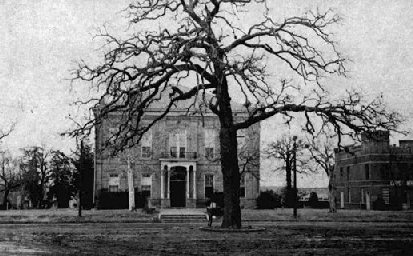The Hanging Tree
|
Once upon a time a tree stood in front of the courthouse. It's
gone now but it's memory lingers on. At various times in the
history of that tree, from the days of the Civil War until 1919, it's
limbs were used to dispatch someone on the way to eternity.
Although many stories have been told about that old tree not many
written accounts have been located other then that published on November
27, 1919 (this is different than the date on the article?) in The
Record. |

|
An Awful Murder Monday morning
just as day was breaking two gun shots were heard in the south part of
town, and soon the alarm was given that Jim Sinclair had been murdered
at his home, his mother and sister finding him where he had fallen in
the horse lot, with a wound in the right eye, and another in the right
shoulder, his slayer being only a few feet away when the shots were
fired. Tracks were found leaving the place which led southeast,
and his mother gave as her idea that a colored tenant on the farm who
had been mad with her son all the fall, was the guilty one. Deputy
Sheriff Wade Lowrance went to the tenants home at once, but he had been
there and left. The negro's brother-in-law was at the house and he
stated that he had not seen his brother-in-law that morning. He
gave for his reason for being at the house that he had come to get some
clothing for his sister, as she had been assaulted the night before and
had come to his house in her night clothes. Mr. Lowrance and those
with him understood this negro to say the woman had been whipped by her
husband, but he later changed this part of his story. Mr. Lowrance
came back to town to get men to assist in running down the murderer and
all went to the house of Hosea Johnson, where the woman had been, though
she had come up the road then a short way to her father's house.
When the men arrived the negroes told that the woman had come to Hosea's
at 8 o'clock the night before and she stated she had been dragged from
bed at that time and assaulted by Jim Sinclair, her husband being at
that time in Centerville, where he preached at the colored Baptist
Church that night. Several men who were with Mr. Sinclair in
Centerville that night till 8:30 Sunday night, and knew this was false,
as the house was three miles from town and such a thing was impossible.
The woman was sent for , and after being assured that she would not be
allowed to be harmed by her husband, admitted that he had made her
disrobe and go to her brother's ahead of him and tell this story of the
assault by Mr. Sinclair. He then came, pretending to be looking
for his wife, who repeated the phony theory to him. He then
pretended to go back to his house and came back with his gun; then went
to other negro houses, asking for shell, and telling of the pretended
injury to his wife, at the same time declaring vengeance against her
alleged assailant. He told that he was going to Sinclair's barn
and lay in wait till next morning, and when he came out to feed that he
was going to blow his brains out. The horrible tragedy took place
as he had planned it. |